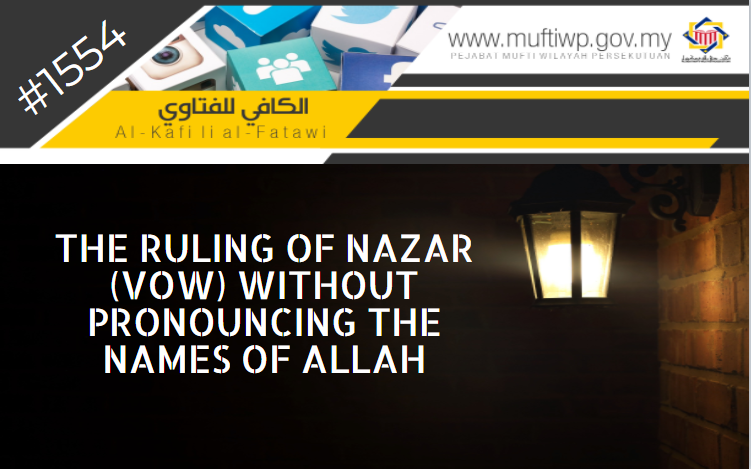Question:
Salam. I would like to ask. Is a nazar invalidated if we do not pronounce the names of Allah. For example: “If I get 10 As for SPM, I will fast for ten days”. The utterance is just like that. Hope for an explanation.
Answer:
Alhamdulillah, praise and thanks to Allah for the countless blessings He has blessed us all with. Blessings and salutations to the Prophet Muhammad PBUH, his wives, his family, companions and all those that follow his teachings to the day of judgement.
Nazar lexically means a vow to do good or evildoing. While technically, nazar is defined as:
اِلْتِزَامُ قُربُةِ لَم تَتَعَيَّن فِي الشَّرْعِ، إِمَّا مُطْلَقًا، أَوْ مُعَلَّقًا عَلَى شَيْء
Obligating oneself with a qurbah action (ibadah which drives one closer to Allah) which is not obligated by shara’ (upon him), whether in absolute manner or by ta’liq (attach) it with something. Refer Al-Mu’tamad fi al-Fiqh al-Syafie, Dr. Muhammad Al-Zuhaili (2/501).
The ruling of fulfilling a nazar is wajib if it is a good deed. This is in accordance with the saying of Allah SWT:
وَلْيُوفُوا نُذُورَهُمْ
and fulfil their vows
Surah al-Hajj (29)
The same goes for a hadith narrated by Ummu al-Mu’minin Aisha R.Anha where she said that the Prophet PBUH said:
مَنْ نَذَرَ أَنْ يُطِيعَ اللَّهَ فَلْيُطِعْهُ، وَمَنْ نَذَرَ أَنْ يَعْصِيَهُ فَلاَ يَعْصِهِ
"Whoever vows that he will be obedient to Allah, should remain obedient to Him; and whoever made a vow that he will disobey Allah, should not disobey Him."
Sahih al-Bukhari (6696)
The scholars state that nazar has three rukn:
- Sighah (pronouncement)
- Person who says the nazar (الناذر)
- Things which becomes the nazar (المنذور)
Sheikh Dr. Muhammad al-Zuhayli in explaining the first rukn which is sighah, said: “It (sighah) is a pronouncement which comes from the one who says the nazar. And nazar is invalidated except by words, in which one says: ‘Unto Allah upon myself certain deed’ if one says: ‘upon myself such or such deeds’, the nazar is valid. This is because, the ibadah will not take place unless solely for Allah”. The most complete pronouncement of sighah nazar is like: “If Allah heals my sickness, so unto Allah upon me such or such deeds”. And it is conditioned upon sighah to be done by words showcasing iltizam (earnestness). Refer Al-Mu’tamad, Dr. Muhammad Al-Zuhaili (2/505).
Also, Sheikh Zakaria bin Ahmad bin Zakaria al-Ansari states:
كَقَوْلِ مَنْ يَصِحُّ نَذْرُهُ ‘’لِلَّهِ عَلَيَّ كَذَا’’ أَوْ ‘’عَلَيَّ كَذَا’’ بِدُونِ لِلَّهِ إذْ الْعِبَادَاتُ إنَّمَا يُؤْتَى بِهَا لِلَّهِ فَالْمُطْلَقُ فِيهَا كَالْمُقَيَّدِ عَلَى الْأَصَحِّ
Like their pronouncement which nazar is valid: “Unto Allah upon me such deeds”, or “upon me such deeds” without mentioning “unto Allah”. Because these acts of worship are done solely due to Allah. So, the pronouncement in general (umum) form is the same as muqayyad (tied with the name of Allah) according to the most sahih opinion. Refer Al-Ghurar Al-Bariyyah (5/208).
Coming back to the presented question above, the nazar is included as nazar al-tabarrur (التَّبَرُّرِ) which is mentioned as nazar al-mujaazah (المجازاة). The meaning of nazar al-mujaazah is: A person obligates himself with an ibadah as a return of receiving a blessing or avoided from any harm upon him. Therefore, if it is settled what he wished for, then it is wajib for himself to fulfil the nazar he pronounced.
Closing
As a conclusion, we state here that the ruling of nazar without pronouncing the names of Allah is valid. This is because, an ibadah is surely performed solely due to Allah. Therefore, in this case, if he receives what is mentioned in his nazar, then it is wajib for him to fast for the period of time mentioned as stated in the hadith of the Prophet PBUH:
مَنْ نَذَرَ أَنْ يُطِيعَ اللَّهَ فَلْيُطِعْهُ
Whoever vows to obey Allah, let him obey Him
Sahih al-Bukhari (6696)
Lastly, we pray that Allah SWT give true understanding to us in the religion. Ameen.


